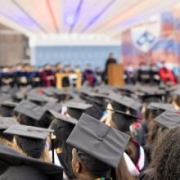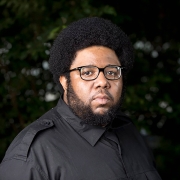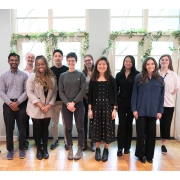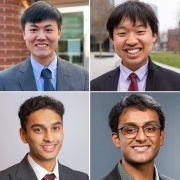Penn Arts and Sciences Names 2016 Dean’s Scholars
Penn Arts and Sciences has named 20 students from the College of Arts and Sciences, the College of Liberal and Professional Studies, and the Graduate Division as Dean’s Scholars. This honor is presented annually to students who exhibit exceptional academic performance and intellectual promise. The 2016 Dean’s Scholars were formally recognized as part of the Levin Family Dean’s Forum on March 30.
COLLEGE OF ARTS AND SCIENCES
Hannah Bucklin (Biochemistry and Biophysics) is a senior in the Roy and Diana Vagelos Program in the Molecular and Life Sciences who is also submatriculating into a master’s in chemistry. She has conducted research in the Perelman School of Medicine’s Center for Neurodegenerative Disease Research since 2013, mastering a broad range of highly sophisticated laboratory techniques. Hannah has conducted important experiments on Parkinson’s disease and will be a key co-author of an article on the study as well as other publications deriving from her independent senior research thesis.
Lucia Calthorpe (Health and Societies) is a senior in the Civic Scholars program. She has engaged in an impressive array of research projects ranging from the politics of polio eradication in Nigeria to the nonlinguistic elements of a 15th-century medical manuscript. Lucia’s honors thesis combines a legislative history of the federal school lunch program with an ethnography of the Food Services Division of the Philadelphia School District. Her quantitative survey data analysis has already been praised for its sophistication and breadth.
Neil Cholli (Mathematical Economics and Political Science) is a senior who has pursued a rigorous course of study including graduate-level work in mathematics, economics, and urban studies. As a Penn Program for Public Service intern he produced a comprehensive analysis of job placement services. Neil also explored antipoverty policies as an intern in the Philadelphia Mayor’s Office of Community Empowerment and Opportunity, and he is writing what promises to be a thought-provoking senior honors thesis in economics, using technical microeconometric tools to revisit questions that lingered after his earlier research.
Laura Christians (Russian) is a senior with a stellar reputation as a scholar and educational activist. She is the recipient of an American Council of Teachers of Russian Post Secondary Russian Scholar Laureate Award. An American raised in Russia, Laura came to Penn and pursued a challenging curriculum of undergraduate and graduate courses in Russian and education. She has become passionate about educational reform for children in Russia’s social orphanages, and has conducted research and leveraged her multilingualism to teach in St. Petersburg, Russia and the Czech Republic.
Jennifer Hebert (Biological Basis of Behavior) is a senior who was elected to Phi Beta Kappa in her junior year and last fall was awarded a Rhodes Scholarship with which she will pursue a master’s in psychiatry at Oxford. In labs at the Perelman School of Medicine and Penn Arts and Sciences she is studying the mechanisms underlying memory formation and the generational effects of nicotine exposure in mice. Jennifer has presented her research at the Society of Neuroscience national conference and published her results in Frontiers of Neuroscience.
Zachery Iton (Chemistry and Materials Science) is a junior in the Vagelos Integrated Program in Energy Research who has been conducting research in Richard Perry University Professor Chris Murray’s lab. Using a microwave reactor to irradiate VOx nanocrystals in different solvents for varying periods of time, Zachery investigated the achievement of phase change from VOx, which he synthesized, to thermochromic vanadium dioxide (VO2), which has potential applications in energy-efficient window treatments among several other energy-saving uses.
Nicholas McGreivy (Physics) is a junior who is researching neutrinos, the tiny, possibly massless particles produced by the sun, stars, supernovae, and nuclear power plants through the process of nuclear fusion and decay. He has distinguished himself in Professor Joshua Klein’s group, quickly learning complex software tools and schematics while working to solve challenging problems related to the design and construction of data acquisition electronics for neutrino experiments. As a learning assistant in Physics 101, Nick has coached his non-major peers through the process of solving novel problems in physics.
Kate Samuelson (Political Science) is a junior in the Civic Scholars Program who has been awarded the Thouron Prize and been accepted as a submatriculant for a Master of Public Affairs at the Fels Institute of Government. Her research endeavors included internships in the Office of Presidential Personnel at the White House, the U. S. Department of Housing and Urban Development, the Philadelphia Mayor’s Office, and Children’s Hospital of Philadelphia. Kate is also co-director of Penn Women’s Political League and serves as president of Penn’s Childhood Cancer Coalition.
Xeno Washburne (English and Gender, Sexuality, and Women’s Studies) is a senior who is doing pioneering work at the intersection of transgender and disability studies, with a focus on neurodiversity. His senior thesis, based on innovative research on Internet communities around autism and gender conformity, makes sophisticated use of a diverse range of scholarship. Xeno also founded Penn Disability Advocates and has been a committed activist for a campus that is more welcoming to trans students and students with disabilities.
COLLEGE OF LIBERAL AND PROFESSIONAL STUDIES – UNDERGRADUATE PROGRAM
John Paul Hagan (Psychology) researches the field of human decision-making known as neuroeconomics. He has worked with patients suffering from brain injuries to identify how their conditions affect their decision-making, and he has conducted psychophysiology research such as EEG, muscle activity, and skin conductivity to learn how conditions such as anxiety and depression differ from each other—and from non-clinical conditions—on a biological level. John Paul is currently examining the impact of individual differences such as personality traits and values on normative/moral decision-making.
PROFESSIONAL MASTER’S PROGRAMS
Anthony Kacmarsky (Organizational Dynamics) brings his expertise in law and commercial real estate and development to his coursework in leadership, change management, coaching, sustainable development, and global studies, enhancing the learning experience of his fellow students and instructors alike in the process. His research focuses on decision and choice under conditions of uncertainty and complexity. In his capstone project, Tony aims to synthesize interdisciplinary scholarship on the construction of a decision model that can be used in confronting increasingly complex choices in a global environment.
GRADUATE DIVISION – DOCTORAL PROGRAMS
Megan Boomer (History of Art) developed her interest in the medieval cultures of the Mediterranean into a challenging interdisciplinary dissertation topic which addresses the formative period in the 12th century when Crusaders attempted to define a history of sacred presence in order to connect their re-imagined landscapes to concepts of salvation. In contextualizing physical remains and examining evidence of Byzantine and Muslim patronage of sacred sites of the same period, Megan is uncovering new understandings of intercultural engagement and expanding the academic discourse on symbolic appropriations of the landscape.
Kai-Young Chan (Music) is, as one professor notes, “a composer of exceptional promise” whose music is performed and recorded by orchestras and ensembles worldwide, from Asia to Europe and Latin America. His dissertation, an orchestral piece entitled Adrift at the End of Dreams, reflects the depth of his thought and seamless experimentation at the borders between Anglo-European and Chinese traditions. Young’s facility with instruments extends from the two-string bowed instrument, the erhu, which he learned in his native Hong Kong, to the piano and digital media.
Betsie Garner (Sociology) is a fifth-year Ph.D. student whose research has taken her from Philadelphia museums where she observed parenting strategies in public settings to Rockdale County, Georgia, where she is conducting dissertation research on how race, class, and family life are experienced and negotiated in the southern U.S. In the process, she is not only creating new understandings of formerly unquestioned social phenomena such as “southern hospitality” but also developing an unprecedented critique of traditional sociological ethnography.
Andrea Gazzoni (Romance Languages) is in his fourth year in the Italian Studies doctoral program. His research on a comparative theory of epic as a genre in the works of Dante, Petrarch, and Boccaccio has garnered wide recognition due to its importance in filling current gaps in literary studies. Andrea is also an accomplished translator of poetry, introducing Italian readers to the works of important authors such as Caribbean poet and literary scholar Kamau Brathwaite and Nobel laureate Derek Walcott.
Karen Kovaka (Philosophy) specializes in the philosophy of science, science policy, and environmental ethics. She is currently focused on questions of how researchers do and should resolve disagreements in scientific debates, particularly regarding the concept of biological individuality and the ongoing controversy surrounding the significance of non-genetic inheritance. Karen also studies disagreement and underdetermination in the wider world of science policy and environmental ethics, such as the relationship between public acceptance of scientific consensuses on evolution, anthropogenic climate change, and public understanding of the nature of science.
Anusha Krishnan (Mathematics) came to Penn with a combined bachelor’s and master’s degree in math and scientific computing. She is a third-year Ph.D. student who has obtained substantial results in two different research directions. Working in the field of differential geometry, Anusha investigates obstructions to fatness, which is a curvature condition in the total space of fiber bundles with totally geodesic fibers. Her collaborative work in finding examples of four-dimensional manifolds in which the Ricci flow preserves nonnegative sectional curvature is expected to be published in an influential research journal.
Elaine LaFay (History and Sociology of Science) is as skillful at engaging students in actively learning about the healing recipes of 12th-century German abbess Hildegard of Bingen as she is in researching primary resources to uncover relationships between health and place in the 19th-century U.S. Her dissertation, which focuses on how physicians, scientists, travelers, and residents of Gulf Coast states sought to understand and transform the region, is expected to greatly advance understandings of the interplay of racialized bodies, labor, landscapes, and climate in the development of antebellum American identities and ambitions.
Nathaniel Shils (Political Science) specializes in political theory and Jewish political thought. His research traces the interaction of divergent conceptions of sovereignty, statehood, citizenship, national belonging, and self-determination that have been articulated in modern Jewish politics, with a focus on Zionism and Israel. Themes central to his work include the relationships between history, memory, and rights; space and time; territory and sovereignty; exile and diaspora; and the intergenerational transmission of political ideas and commitments. Nate’s other research interests include the materiality of states and the roles of dreams and the imagination in politics.
John Tellis (Chemistry) has developed groundbreaking new reaction schemes over the course of his research into photoredox cross-coupling, processes which have transformed the synthesis of organic compounds ranging from small molecules to polymers and macromolecular entities. John has received numerous national and international awards, including fellowships from the American Chemical Society and Bristol-Myers Squibb, and his work, primarily conducted as part of Hirschmann-Makineni Professor of Chemistry Gary Molander’s group, has resulted in seven publications, including two first-author credits in the highly prestigious journals Science and Analytical Chemistry.





